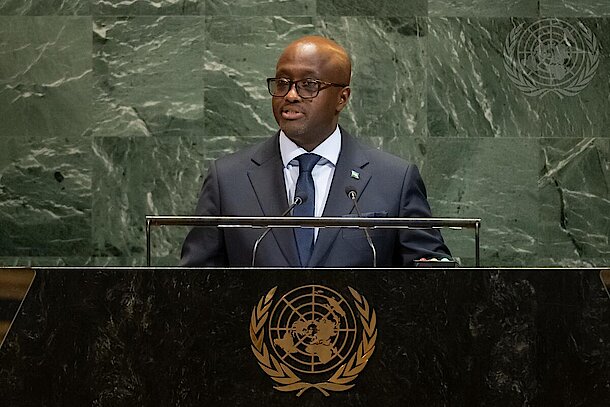New York – Rwanda’s Minister of Foreign Affairs, Olivier Jean Patrick Nduhungirehe, has sounded the alarm over the deteriorating situation in the Democratic Republic of Congo (DRC), urging Kinshasa to abandon its military approach and fully implement the Washington Peace Agreement signed in June this year.
Addressing the 80th Session of the United Nations General Assembly, Minister Nduhungirehe said the conflict in Eastern DRC, rooted in decades of bad governance, marginalisation, and genocide ideology, cannot be solved by force. Instead, he stressed, only genuine political dialogue offers a sustainable solution.
“The DRC’s renewed militarisation, its collaboration with genocidal and UN-sanctioned armed groups such as the DRC-backed FDLR and Wazalendo militias, and the use of attack drones and fighter jets against civilians—particularly the Banyamulenge and other Congolese Tutsi—underscore the gravity of the crisis,” Nduhungirehe said.
He warned that these developments undermine the spirit of the Washington Peace Agreement, which set out a framework for security, political, and economic cooperation between Rwanda and the DRC. The deal was brokered under the leadership of U.S. President Donald Trump and Qatar’s Emir Sheikh Tamim bin Hamad Al Thani, with support from African-led initiatives, including the EAC-SADC process and the African Union.
Despite this diplomatic breakthrough, implementation has stalled, while violence on the ground intensifies. “Rwanda condemns these developments and calls on the DRC to reject the military solution and implement in good faith the Washington Peace Agreement, which is a golden opportunity to end this conflict that has lasted for far too long,” he added.
Concerns over MONUSCO and Wazalendo Militias
The Minister sharply criticised the United Nations peacekeeping mission in the DRC (MONUSCO), saying it has failed to halt the proliferation of armed groups and has, instead, ended up working alongside coalitions that include the FDLR. He called for an urgent review of the mission’s mandate.
Of particular concern, he said, is the rise of the Wazalendo militias, armed and supported by the DRC government. These groups, he alleged, have engaged in atrocities reminiscent of the genocidal militias of 1994 in Rwanda, including lynching, burning alive civilians, and arming children for ethnic cleansing.
“Their brutality, methods and ideology bear an alarming resemblance to that of the genocidal militias of 1994 in Rwanda. Strong action is needed to put an end to this dangerous development before it is too late,” Nduhungirehe warned.
Early Warning Signs of Genocide
The Minister accused the DRC government of enabling crimes that amount to crimes against humanity and carry all the early warning signs of genocide. He pointed to the targeting of Congolese Tutsi communities, including the Banyamulenge, as evidence of systematic persecution.
“Genocide follows a pattern. It follows clear stages. It is not an umbrella term; it is defined by international law. Genocide targets a specific group for who they are, with the intent to exterminate them as such,” he said, adding that governments providing weapons to groups with a genocidal record are complicit in the crime itself.
A Call for Global Responsibility
Nduhungirehe urged the international community not to “turn a blind eye, once more, to what is clear to see” in Eastern DRC. He argued that if the underlying drivers of the conflict—corruption, bad governance, and embezzlement of public funds—are not addressed, military operations will only prolong suffering and instability.
Rwanda, he concluded, stands ready to work with all partners to pursue peace, justice, and sustainable development in the region.
